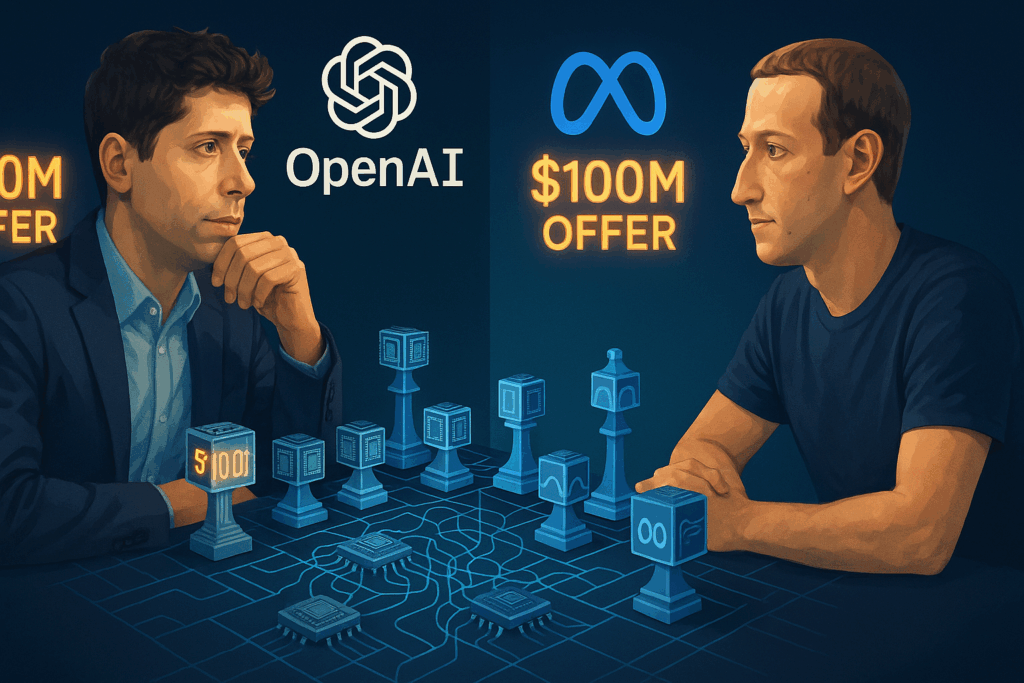
TL;DR
- Meta offered $100M+ compensation packages to poach top AI talent from OpenAI and Google DeepMind.
- Sam Altman confirmed the offers but claimed no top OpenAI staff accepted.
- Altman criticized Meta’s culture, suggesting it lacks innovation and mission alignment.
- Meta has hired some key figures (e.g., Jack Rae, Johan Schalkwyk) and invested in Scale AI.
- OpenAI may soon release an AI-powered social app, potentially challenging Meta’s core products.
- The AI talent war intensifies, with OpenAI, Anthropic, and DeepMind accelerating R&D at pace.
Meta’s $100M Talent Play Fails to Sway OpenAI Engineers
In a bold but seemingly unsuccessful move, Meta has attempted to poach leading artificial intelligence researchers from OpenAI with offers exceeding $100 million per head. The revelation came directly from OpenAI CEO Sam Altman, who spoke candidly on a podcast hosted by his brother, Jack Altman, published Tuesday.
Altman claimed Meta had approached multiple members of OpenAI’s research team with $100 million signing bonuses and even larger annual compensation packages to join Meta’s new superintelligence team, led by Alexandr Wang, former CEO of Scale AI. Despite the scale of these offers, Altman said none of OpenAI’s “best people” had accepted.
“Meta started making these giant offers to a lot of people on our team,” said Altman. “I’m really happy that, so far, none of our best people have decided to take him up on that.”
Culture Over Cash: Why OpenAI Talent Stayed Put
While the figures may seem irresistible, Altman argued that OpenAI’s employees stayed because they believe in the mission of achieving Artificial General Intelligence (AGI). He said OpenAI’s long-term vision and culture of innovation outweighed Meta’s monetary appeal.
In contrast, Altman painted Meta as overly reliant on financial incentives rather than mission-driven innovation, which he said could ultimately hurt its ability to compete in the AI space.
“I don’t think they’re a company that’s great at innovation,” Altman added. “They’ve built impressive things, but that’s different from pioneering the future of intelligence.”
Notable AI Talent Movement and Offers (2024–2025)
| Company | Key Figures Poached or Targeted | Offer Size (Reported) | Outcome |
| Meta | Noam Brown (OpenAI) | $100M+ | Rejected |
| Meta | Koray Kavukcuoglu (Google DeepMind) | $100M+ | Rejected |
| Meta | Jack Rae (Google DeepMind) | Unknown | Accepted |
| Meta | Johan Schalkwyk (Sesame AI) | Unknown | Accepted |
| Meta | Alexandr Wang (Scale AI CEO) | Hired to lead team | Confirmed |
| OpenAI | No confirmed new hires from Meta | N/A | N/A |
Meta’s AI Ambitions: Wang’s Role and Scale AI Investment
Meta’s strategy appears to center around building an elite research lab for superintelligence development, mirroring OpenAI’s original structure. The company hired Alexandr Wang, a high-profile name in AI infrastructure, and made a substantial investment in Scale AI, Wang’s former startup. The move positions Meta to control more of the data labeling and training infrastructure crucial for advanced AI systems.
The team will reportedly work physically near Mark Zuckerberg, a reflection of how critical AI has become to Meta’s long-term strategy. Still, Altman believes Meta’s strategy lacks the cultural cohesion and philosophical depth required for true breakthroughs in general intelligence.
OpenAI’s Upcoming Moves Could Escalate the Battle
OpenAI isn’t standing still. According to internal leaks and hints from the podcast, the company is developing a new AI-powered social media application. Altman described a platform that uses AI to curate personalized content feeds, stepping away from traditional social media algorithms in favor of user-driven customization.
Such a product could pose a direct competitive threat to Meta’s family of apps, including Facebook and Instagram, which are increasingly integrating Meta AI into user experiences. However, early user reviews suggest confusion and privacy concerns over Meta AI’s responses and interactions.
Meta, for its part, is also experimenting with AI-native social apps, although product-market fit remains uncertain.
The Talent Arms Race: Meta, OpenAI, DeepMind, Anthropic
The failed poaching efforts underscore how fierce the competition is for elite AI researchers. With only a few dozen individuals globally capable of pushing the frontier of AGI, retaining talent has become a strategic necessity.
Meta’s recent hires, while notable, are not enough to close the gap. OpenAI, Anthropic, and Google DeepMind continue to ship frontier models and advance the benchmarks. Meta’s models, including the LLaMA series, have yet to match the public impact of OpenAI’s GPT models or Anthropic’s Claude.
Risks of a Compensation-Led Strategy
Altman warned that focusing solely on compensation could be a losing strategy. He emphasized that innovation comes from culture, not capital, and that a company’s ability to execute depends less on financial muscle and more on intellectual environment and leadership clarity.
Meta’s large checks may attract attention, but they haven’t delivered top-tier hires from OpenAI — yet.
“You don’t catch up in AI by paying more. You catch up by building differently,” Altman concluded.
Strategic Threats and Future Outlook
With OpenAI rumored to launch an open-source or semi-open model, possibly akin to Claude or Mistral, Meta could face added pressure. If OpenAI succeeds in releasing a product that’s both free and highly capable, it could undercut Meta’s developer ecosystem and further widen the trust and innovation gap.
Meanwhile, Altman’s subtle pitch for a more transparent, mission-aligned AI company stands in contrast to Meta’s more corporate approach, hinting that the next era of AI may be shaped as much by values as by algorithms.
Final Thoughts: Culture, Not Cash, Wins the AI Race
The battle for AI dominance is no longer just about compute, data, or even models. It’s increasingly about people — and the values and environments that attract them. Meta has money and ambition, but Altman argues OpenAI has purpose. If the next phase of AGI is to be a cultural as well as technical leap, the hiring war may depend less on cash and more on conviction.





